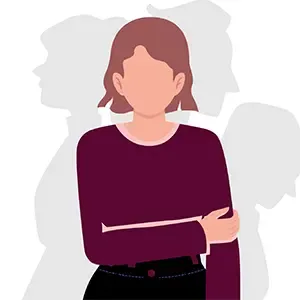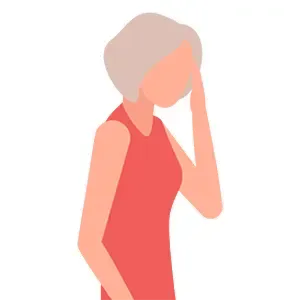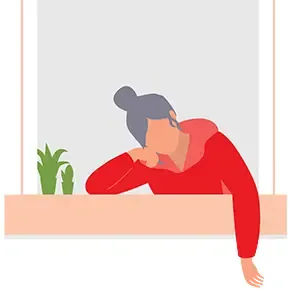The Lived Experiences and Concerns of Older Veterans
Military service can open up opportunities to travel, pursue an education, build leadership skills and lifelong friendships. Research shows that while there are some negative outcomes impacting veterans, many veterans benefit from personal developmental gains from service. The ability to travel during military service is a key source of joy for older veterans. Another source of joy for older veterans are the fictive kinships, or friendships, that are sometimes developed through service. Friendships act as a safeguard against adverse outcomes and foster resilience. Additionally, enduring friendships formed during service can create strong bonds among veterans due to shared experiences.
Still, the transition to civilian life and the years that follow can introduce complex health and personal hurdles for many veterans, especially related to their health and well-being. Many older veterans grapple with multi-faceted health issues following their military service, including service-related disabilities. Despite the existence of many services and benefits designed for veterans, navigating the complex administrative landscape can be challenging.
Social isolation and mental health, and disabilities among veterans may be distinct compared to other aging populations because of compounding factors such as reintegration challenges, service-related trauma (especially for those who served in combat), housing instability and higher levels of caregiver burden. According to AARP’s Vital Voices: Issues That Impact U.S. Military Veterans and their Family Members Age 45 and Older, 42% of veterans ages 45–64 say they sometimes or often lack companionship, 41% feel left out, and 38% feel isolated from others.
Percent of veterans ages 45–64 who say they…



In addition to social isolation, some of the biggest concerns for older veterans include:
Accessing resources and benefits
Not all veterans qualify for support resources such as a military pension, health care or other VA benefits, and some who would qualify may not realize they are eligible or may be intimidated by the process of applying for benefits or accessing resources.
On the question of whether there are currently enough services and resources available to support older veterans and their families, the veterans and military spouses we spoke to, and data collected via AARP Research, showed mixed opinions.
Without groups like The American Legion helping veterans, it would be very difficult.
- Male, 78, veteran
There is more consensus about the complexity involved with navigating veterans’ resources, with nearly everyone agreeing the process can be confusing and overwhelming. These findings suggest simplifying the process would make a big difference.
More funding is needed and better coordination between federal, state, county and nonprofits to close service gaps. Veterans may not be tech savvy or not have internet or not good internet. It’s hard for them to navigate the VA website on their computer or phone.
– Female, 52, veteran and spouse of a veteran
For veterans and their families, accessing medical treatment and other services involves unique challenges that are not an issue for their civilian counterparts. Whether or not they are eligible for government benefits related to their military service, many veterans rely on an assortment of resources, sources of support and health care programs.
Veterans of different age groups or from particular service eras (such as those who served during the Vietnam War, the Gulf War, the Iraq War, etc.) have distinct needs and experiences. Whereas older veterans may be dealing with more chronic health issues, younger veterans may be more tech-savvy but less aware of traditional VA benefits. As the VA notes, certain health conditions may be more of a concern for veterans who served in a particular time or place.
Achieving and maintaining financial security
In 2022, AARP found that 84% of veterans age 45-plus felt they had sufficient savings or income to retire, and in 2021, 72% believed they would be able to stop working at their desired age. Additionally, AARP discovered that 83% of older veterans in this age group currently rely on or plan to rely on Social Security benefits, 56% will depend on their personal savings and 42% will utilize VA benefits during retirement.
I am pretty well situated at this point in time, but I worked in the private sector for many years.
– Male, 78, retired veteran
Veterans and military families know the importance of a carefully thought-out strategy, and many veterans have taken proactive steps that make them feel confident about their financial security in their retirement years.
Percent who plan to use the following during retirement
Among veterans ages 45+
| Item | Percent |
|---|---|
| Social Security benefits | 83% |
| Personal savings | 56% |
| VA benefits | 42% |
But planning for retirement can be tricky, particularly when veterans face unexpected personal/family situations or medical issues. Like other Americans, many veterans may also have the financial burdens of student loans and other consumer debt, in addition to other financial obligations.
Some older veterans have discovered that the reality of retirement looks much different from how they had expected to spend their later years. While many people experience a self-perceived lack of purpose after leaving the workforce, this adjustment to leaving the workforce can be especially challenging for veterans who must adapt to a life where they no longer have an official “mission.”
Avoiding fraud and scams
Veterans may be particularly vulnerable to fraud. A striking 80% of veterans and military are targeted by scammers, and 40% have lost money to scams. According to the Federal Trade Commission, among military retirees/veterans, there were 74,227 reports of fraud and an estimated total fraud loss of $350 million in 2023.
I’ve been targeted for lots of phone, email, and text scams. I don’t answer or return their queries if I don’t know who they are. I got a few queries related to my VA loan after buying a house. Some could’ve been scams.
– Male, 56, veteran
Most of the fake offers appear on Facebook offering huge discounts for retired service people on insurance and other products.
– Male, 80, veteran
Percent of veterans and military who…
| Group | Percent |
|---|---|
| Are targeted by scammers | 80% |
| Lose money to scams | 40% |
Scammers often specifically target veterans by pretending to be a fellow servicemember and taking advantage of this “shared connection.” The military community is known for their strong bonds and sense of kinship, which can be especially true among older veterans. Criminals may try to exploit the generosity of veterans, who feel compelled to help when someone claims to be in need. According to AARP, “two common schemes to steal from veterans are pension poaching and medical device scams. Shady investment advisors often target veterans with promises to ‘maximize’ their pension benefit or offer to buy out their benefits.” Overwhelmed veterans trying to muddle through the red tape involved in applying for disability benefits may be more susceptible to these types of schemes.
According to a 68-year-old retired VA rater, the internet can be both a blessing and a curse for those seeking help with finding their way through VA systems. There are plenty of people on YouTube and Facebook offering advice—and in some cases, fee-charging “consultation services”—on navigating VA healthcare and disability systems. Some of these resources are useful, while others are what he calls “sharks” who will provide incorrect information or charge money for services that are already available to veterans for free, such as getting assistance in filing a VA claim or appeal, accessing homemaker and home health aide services, or applying for VA home loans.
Health issues and access to healthcare
Access to health care is a key issue for older veterans, and it is important that health care providers are educated on the needs of today’s diverse military and veteran populations. Veterans often discover noticeable differences between VA health care resources and general providers, both in terms of accessibility and depth of knowledge about specific physical and mental health issues relevant to veterans.
For example, the American Cancer Society notes veterans may have an increased risk for some cancers because of their exposure to burn pits, chemicals like asbestos and Agent Orange and other hazards. Since some exposures can lead to cancers that develop years later, this issue is of particular concern to older veterans. Nearly 50,000 cases of cancer are reported annually in the VA Central Cancer Registry. For Agent Orange alone, the VA has identified eight types of cancer commonly associated with exposure to that toxin.
Navigating the VA system is very difficult. It needs to be streamlined.
– Male, 57, veteran
I think private practitioners could be more aware of service-connected illnesses, especially those related to Agent Orange and exposure to other toxins. Maybe the VA could do a better job of communicating with the local medical community.
– Male, 80, veteran
The VA provides information related to health conditions associated with Agent Orange, in addition to other health concerns for veterans from specific time periods and service areas, but some civilian health providers may not be as familiar with this information. Improving efforts to ensure all health care providers have up-to-date, accurate information about the needs and concerns of patients who are veterans is of critical importance.
Older veterans should be sure to inform their doctors about their military service, including locations in which they served and any potential toxins to which they may have been exposed.
In addition, the VA’s National TeleOncology Program is a telehealth service that veterans can use for cancer-related screenings, diagnosis and treatment, which can be especially helpful for veterans in rural areas who may not have oncology treatment resources close to them.
As a disabled Veteran, I’m able to access healthcare through Medicare A and B, which I augment with VA for ophthalmology, dental, and hearing, as well as prescriptions. The VA offers routine visits with a staff PCP, who are more aware of issues related to Agent Orange.
– Male, 80, veteran
Traversing this patchwork of systems can involve additional challenges, but veterans’ organizations and advocacy groups can make a big difference by providing valuable assistance.
I belong to The American Legion and our mission is to provide support services to veterans through our Service Officers. We help veterans navigate health care and other social services. We have over 2,000 posts nationwide and over 1.6 million members. Without this supplemental support we offer, there would be a dearth of support.
- Male, 78, veteran
Healthcare services for veterans should also incorporate support for their mental health, including PTSD-related issues that are especially common among veterans who served in combat. This trend appears to be going in the right direction, as AARP research has found that veterans ages 45–64 are more likely to receive mental health treatment than veterans 65 and older.
Percent of veterans 45+ receiving mental health treatment
By type of treatment and age range
Currently receiving
| Treatment | Age Range | Percent |
|---|---|---|
| Counseling or therapy | Age 45–64 | 21% |
| Counseling or therapy | Age 65+ | 8% |
| Prescription medication | Age 45–64 | 24% |
| Prescription medication | Age 65+ | 8% |
Received in the past five years
| Treatment | Age Range | Percent |
|---|---|---|
| Counseling or therapy | Age 45–64 | 29% |
| Counseling or therapy | Age 65+ | 13% |
| Prescription medication | Age 45–64 | 33% |
| Prescription medication | Age 65+ | 10% |
Women veterans sometimes feel their health care needs are an afterthought. Female veterans face health challenges their male counterparts less often face, including higher rates of military sexual trauma (MST), with research showing 44% of women have experienced MST compared to 4% of men. The VA reports that approximately one in three women veterans tell their VA health care provider they experienced sexual harassment or assault while in the military.
Female veterans are also more likely to experience mental health issues such as PTSD (13% of women have PTSD compared to 6% of men) and (48% of women veterans from Operation Enduring Freedom/Operation Iraqi Freedom have depression compared to 39% of men), along with gender-specific health concerns such as reproductive health and menopause.
As one Army National Guard veteran shared, “The health care providers that are going to treat veterans, especially in today’s day and age, need to be trained that not all veterans are going to look like a World War II veteran. They’re going to be all different ethnicities. They’re going to be female.”